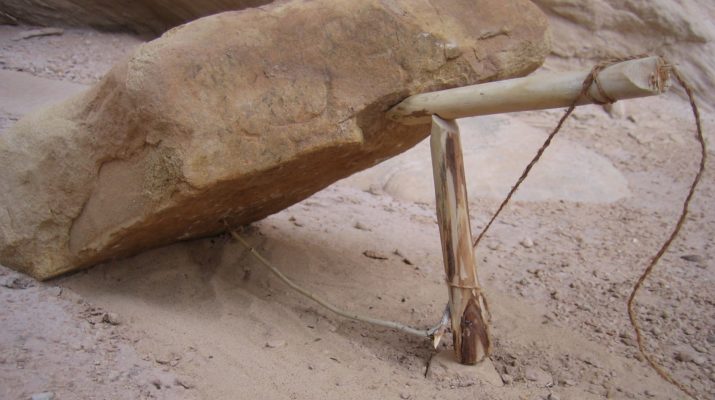Psalm 141
A PsalmA of David.B
1 I call uponC you, O Lord;D come quicklyE to me;
A “Psalm” = mizmor. From zamar (making music; used specially of music to worship God; music with singing, singing praise, singing psalms); may be from zamar (to trim or prune). This is a melody or a psalm.
B “David” = David. From the same as dod (beloved, love, uncle); the root may mean to boil, which is used figuratively to describe love. So, this implies someone you love such as a friend, a lover, or a close family member like an uncle. David’s name likely means something like “beloved one.”
C “call upon” = qara. This is to call or call out – to call someone by name. Also used more broadly for calling forth.
D “Lord” = YHVH. From havah (to be, become) or hayah (to come to pass, become, be). This is the name of the God of Israel, the self-existent and eternal one, the tetragrammaton. This pronunciation has been lost to time so “Lord” is generally used in its place.
E “come quickly” = chush. This is to hurry, be eager.
give earF to my voiceG when I call to you.
2 Let my prayerH be countedI as incenseJ beforeK you
F “give ear” = azan. Perhaps from ozen (ear, hearing, audience, show; properly, broadness – applied to its ear in reference to its shape). Properly, this is to expand or broaden one’s ear i.e. listen intently, pay attention, heed.
G “voice” = qol. This is a sound, used often for human voices. Also used when God speaks or angels, animals or instruments. It can be a cry or a noise, thunder or earthquakes and so on.
H “prayer” = tephillah. From palal (to judge for oneself or in an official capacity; to pray or make supplication, to entreat). This is prayer or intercession. It can also be a hymn.
I “counted” = kun. Properly, this means in a perpendicular position. So, it is set up in a literal sense – establish, fix, fasten, prepare. In a figurative sense, it is certainty, to be firm, faithfulness, render sure or prosperous.
J “incense” = qetoreth. From the same as qitor (thick smoke, vapor). This is smoke, incense, the scent of the sacrifice as it burned.
K “before” = paneh. From panah (to turn, face, appear). This is face in a literal or figurative sense. It could be face, presence, anger, respect. It can also be used of God to indicate divine favor or presence.
and the lifting upL of my handsM as an eveningN sacrifice.O
L “lifting up” = maseth. 16x in OT. From nasa (to lift in a broad sense, literally and figuratively; to carry, take, or arise; to bring forth, advance, accept). This is an utterance, lifting up, collection, uprising, a rising flame or beacon, a present lifted up, a mess, reproach, or burden.
M “hands” = kaph. From kaphaph (to bend – from a root meaning curve or bend down). This is palm of the hand or sole of the foot, footstep, grasp. Figuratively, it can also mean power.
N “evening” = ereb. This is night or dusk.
O “sacrifice” = minchah. This is a gift or an offering, particularly a sacrificial one that is generally bloodless and given spontaneously (voluntarily).
3 SetP a guardQ over my mouth,R O Lord;
keep watchS over the doorT of my lips.U
P “set” = shith. This is to place, set, bring, appoint, consider, bring, array or look.
Q “guard” = shomrah. 1x in OT. From shamar (to keep, watch, or preserve; to guard something or to protect it as a thorny hedge protects something). This can also be a watch or watchfulness.
R “mouth” = peh. This is mouth in a literal or figurative sense. So, more literally, it can be beak or jaws. More figuratively, it refers to speech, commands, or promises.
S “keep watch” = natsar. This is to watch, guard, protect. It can be positive – preserve or obey. It can be negative as conceal.
T “door” = delet. From dalah (to draw, lift up; properly, to dangle; draw water; figuratively, to deliver). This is something that swings like a door, gate, leaf, lid, or other opening.
U “lips” = saphah. This is lip, edge, border, bank – used for a boundary. It can also be speech or language.
4 Do not turnV my heartW to anyX evil,Y
V “turn” = natah. This is to stretch or spread out, to extend, or bend. In can also imply moral deflection.
W “heart” = leb. May be related to labab (to encourage; properly, to be encased as with fat; used in a good sense, this means to transport someone with love; used in a bad sense, it can mean to dull one’s senses). This is the heart, courage, one’s inner self, the mind, or the will. Heart is only used in a figurative sense in the Old and New Testaments.
X “any” = dabar. From dabar (to speak, declare, discuss). This is speech, a word, a matter, an affair, charge, command, message, promise, purpose, report, request. It is a word, which implies things that are spoken of in a wide sense.
Y “evil” = ra’. From ra’a’ (to be evil, bad, afflict; properly, to spoil – to destroy by breaking into pieces; figuratively, to cause something to be worthless; this is bad in a physical, social, or moral sense; that which displeases, to do harm or mischief, to punish or vex). This is bad, disagreeable, that which causes pain, misery, something having little or no value, something that is ethically bad, wicked, injury, calamity. This refers to anything that is not what it ought to be – a natural disaster, a disfigurement, an injury, a sin.
to busyZ myself with wickedAA deedsBB
Z “busy” = alal. 19x in OT. This is to affect, abuse, mistreat, impose, practice, glean, defile.
AA “wicked” = resha. From rasha (to be wicked, guilty, make trouble, do wrong; can also be condemn, guilty, inflict punishment; this verb implies disturbing or violating). This is wrong, particularly moral wrong. It can be wickedness, evil, wicked deeds, or something that is ill-gotten.
BB “deeds” = alilah. Related to “busy” in v4. From alal (see note Z above). This is a deed or action – something that causes an effect. It could be a wanton or shameful deed or an opportunity.
in company with thoseCC who workDD iniquity;EE
do notFF let me eatGG of their delicacies.HH
CC “those” = enosh. From anash (to be weak, sick, or frail). This is human, humankind, another. It is mortal.
DD “work” = paal. This is to do, make, work, or accomplish. Generally refers to regularly repeated or systematic action – so, to practice.
EE “iniquity” = aven. Root may mean panting as one does when expending a lot of energy, especially when it comes to nothing. This is nothingness, trouble, sorrow, distress, wickedness, evil, harm, sorrow, misfortune, and mischief. It is also used specifically to refer to idols.
FF “not” = bal. From balah (to grow old, wear out, consume, waste, enjoy, fail, decay). This is not, lest, neither. Properly, it refers to a failure, so it implies nothing or not at all.
GG “eat” = lacham. This is to eat or feed on. Figuratively, it is to battle as a kind of consumption/destruction.
HH “delicacies” = manammim. 1x in OT. From naem (to be pleasant, beautiful, sweet, or agreeable in a literal or figurative sense). This is delicacies or dainties.
5 Let the righteousII strikeJJ me;
let the faithfulKK correctLL me.
II “righteous” = tsaddiq. From the same as tsedeq (rightness, righteousness, just cause, vindication; that which is right in a natural, moral, or legal sense; abstractly equity; figuratively prosperity). This is just, innocent, righteous, righteous one, or lawful.
JJ “strike” = halam. 9x in OT. This is to strike, hammer, smash, beat, overcome, conquer.
KK “faithful” = chesed. From chasad (being good, kind, merciful; may mean bowing one’s neck as is done in the presence of an equal for courtesy’s sake; so, if one in a superior position is treating you like an equal, that is what is captured here). This is favor, goodness, kindness, loving kindness, pity, reproach, or a good deed. When done by God to humanity, this is mercy/loving kindness. When done by humanity to God, it is piety.
LL “correct” = yakach. This is to decide, be right, argue, or convince. It can also be to decide, convict, reason together, or reprove.
Never letMM the oilNN of the wicked anoint my head,OO
for my prayer is continually against their wicked deeds.PP
MM “never let” = al + nu. Nu is 8x in OT. This is to hinder, discourage, refuse, break, or disallow.
NN “oil” = shemen. From shamen (to shine, which implies being oily, growing fat). This is fat, oil, grease, olive oil – often with perfume. Used figuratively for fertile, lavish, rich.
OO “head” = rosh. This may come a word that means to shake. It is the head, captain, or chief. It can also be excellent or the forefront. It can be first in position or in statue or in time (i.e. the beginning).
PP “wicked deeds” = ra’. Same as “evil” in v4. See note Y above.
6 When they are given overQQ toRR those who shall condemnSS them,
then they shall learnTT that my wordsUU were pleasant.VV
QQ “given over” = shamat. 9x in OT. This is to allow something to drop, release, stumble, upset, let alone, remit, lose.
RR {untranslated} = yad. This is hand, ability, power. Hand in a literal sense, but also what one can do or the means by which one does it.
SS “condemn” = shaphat. This is to judge, defend, pronounce judgment, condemn, or govern. It can refer to God judging or to human judges. This is pronouncing a verdict in favor or against so it implies consequences or punishment. It can also mean to litigate or govern as one with authority.
TT “learn” = shama. This is to hear, call, consent, or consider. It implies listening intelligently, giving attention, and, because of these two factors, obedience and action are often implied.
UU “words” = emer. From amar (to say, answer, challenge). This is something that is said – a word, saying, speech.
VV “were pleasant” = naem. Related to “delicacies” in v4. 8x in OT. See note HH above.
7 Like a rockWW that one breaks apartXX and shattersYY on the land,ZZ
so shall their bonesAAA be strewn at the mouth of Sheol.BBB
WW “rock” = sela. Root may mean being lofty. This is a rock, cliff, crag, mountain. It could be used figuratively for obstinance or to show God as a refuge. It can also more generally mean fortress or stronghold.
XX “breaks apart” = palach + baqa. Palach is 5x in OT. This is to slice, cut up, slash open, give birth, break, plow, pierce. Baqa is to break open, breach, divide, rip, shake, tear. It can also mean dash into pieces or being ready to burst.
YY “shatters” = pazar. 10x in OT. This is to scatter or disperse – whether in a positive sense of sharing abundance or negatively as scattering through force.
ZZ “land” = erets. Root may mean to be firm. This is earth, ground, field land, or country.
AAA “bones” = etsem. From atsam (vast, numerous, strong; to close one’s eyes, to make powerful; to break bones). This is self, life, strength, bone, or substance.
BBB “Sheol” = Sheol. Perhaps from sha’al (to ask, request). This is the place where the dead go, the grace, the underworld.
8 But my eyesCCC are turned toward you, O God,DDD my Lord;EEE
in you I seek refuge;FFF do not leave meGGG defenseless.HHH
CCC “eyes” = ayin. This is eye in a literal or figurative sense so eye, appearance, favor, or a fountain (the eye of the landscape).
DDD “God” = YHVH. Same as “Lord” in v1. See note D above.
EEE “Lord” = Adonai. From adon (lord, master, owner); root means to rule or be sovereign. This is the actual Hebrew word for Lord used (in a different form) of humans and (in the present form) of God. It means someone who is in control.
FFF “seek refuge” = chasah. This is to take refuge or flee for protection. Figuratively, it means to hope or trust in someone or something.
GGG “me” = nephesh. Related to naphash (to refresh or be refreshed). This is soul, self, person, emotion. It is a breathing creature. Can also refer to appetites and desires.
HHH “leave…defenseless” = arah. 15x in OT. This is to be naked, to empty, demolish, pour out, uncover, discover, raze, or leave destitute.
9 KeepIII me fromJJJ the trapKKK that they have laidLLL for me
and from the snaresMMM of evildoers.NNN
III “keep” = shamar. Related to “guard” in v3. See note Q above.
JJJ {untranslated} = yad. Same as {untranslated} in v6. See note RR above.
KKK “trap” = pach. From pachach (to trap, lay a net). This is a snare or bird trap. It can also refer to a sheet of metal hammered into a thin plate.
LLL “laid” = yaqosh. 8x in OT. This is ensnare, lay bait, lure, trapper. It is to snare literally or figuratively.
MMM “snares” = moqesh. Related to “laid” in v9. From yaqosh (see note LLL above). This is bait, barb, snare, trap; a noose or hook to trap animals in a literal or figurative sense.
NNN “evildoers” = paal + aven. Paal is the same as “work” in v4. See note DD above. Aven is the same as “iniquity” in v4. See note EE above.
10 Let the wickedOOO fallPPP into their own nets,QQQ, RRR
while I alone escape.SSS
OOO “wicked” = rasha. Related to “wicked” in v4. See note AA above.
PPP “fall” = naphal. This is to fall, whether by accident, to fall prostrate, or to fall in violent death. Figuratively, it can refer to personal ruin or calamity, a city falling, an attack or a falling away. It can also be a deep sleep or wasting away.
QQQ “nets” = makmar. 2x in OT. From kamar (to grow hot, be aflame, to contract from proximity to heat, to desire or be impacted with passion or pity; can imply tenderness). This is a net or snare.
RRR {untranslated} = yachad. From yachad (to join, be united). This is a unit, both, altogether, unitedness, alike.
SSS “escape” = abar. This is to pass over or cross over. It is used for transitions, whether literal or figurative. It can also mean to escape, alienate, or fail. This is the root verb from which “Hebrew” is drawn.
Image credit: “Paiute Deadfall Trap” by Yourcelf, 2009.




